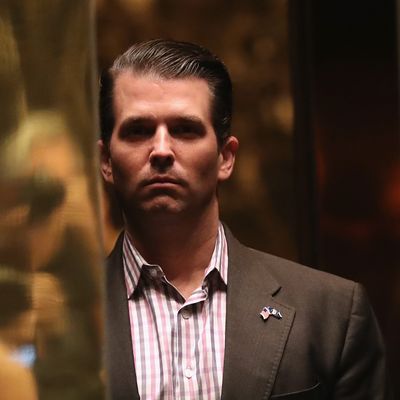
President Donald Trump’s eldest son, as well as other Trump campaign leaders, met with a Kremlin-linked Russian lawyer at Trump Tower two weeks after Trump clinched the Republican nomination for president last year, according to a new report from the New York Times. The Times emphasizes that the previously undisclosed meeting “is the first confirmed private meeting between a Russian national and members of Mr. Trump’s inner circle during the campaign,” as well as the first meeting that the president’s son Donald Trump Jr. is known to have attended himself. Also present at the June 9 meeting was Trump’s son-in-law and current senior White House adviser, Jared Kushner, as well as then Trump campaign chair Paul Manafort — whose own connections to the Putin regime have already come under much scrutiny.
The meeting was not disclosed until Kushner filed an updated request for national-security clearance following an earlier report that he had failed to disclose other contacts with Russian officials in his original request. Representatives for both Kushner and Trump Jr. confirmed the meeting to the Times, and Trump Jr., in a statement, claimed that the meeting was about an adoption program, but did not clarify whether the presidential campaign was also discussed. After the report was published, a spokesperson for President Trump’s outside legal team further suggested that Trump Jr. had fallen into some kind of opposition-research trap.
Trump Jr., along with his brother Eric, are now running the Trump family’s corporation while their father is serving as president.
The Russian lawyer at the meeting, Natalia Veselnitskaya, has been involved in efforts to eliminate the Magnitsky Act, a 2012 U.S. law which targets Russians implicated in human-rights abuses with sanctions, freezing their U.S. assets and barring them from entering the country. At the time it was passed and signed by President Obama, Russian president Vladimir Putin was so outraged by the law that he retaliated by banning American adoptions of Russian children and blacklisting some Americans like former federal prosecutor Preet Bharara, who had led well-known convictions of Russian arms and drug dealers. (Though he had originally asked him to continue to serve as a U.S. attorney, President Trump subsequently fired Bharara in March.)
Veselnitskaya, who represents the Russian owner of a company that Bharara prosecuted, is also married to a former deputy transportation minister in Russia and counts Russian state-owned businesses among her clients. In addition to hiring political and legal operatives to lobby for the repeal of the Magnitsky Act, Veselnitskaya was also involved in the making of a 2016 film meant to discredit the person for whom the act was named, Sergei Magnitsky. Magnitsky was a lawyer and auditor who was killed in a Russian prison in 2009 after exposing a massive corruption scandal in the country. A former senior U.S. law-enforcement official told the Times that Veselnitskaya’s associations had drawn attention from the FBI.
In his statement, Donald Trump Jr. said that he was “asked to attend the meeting by an acquaintance, but was not told the name of the person I would be meeting with beforehand.” His statement added that:
It was a short introductory meeting. I asked Jared and Paul to stop by. We primarily discussed a program about the adoption of Russian children that was active and popular with American families years ago and was since ended by the Russian government, but it was not a campaign issue at the time and there was no follow up.
It’s not clear why Trump Jr. would think the campaign’s chair and one of his father’s closest political advisers would be needed at such a meeting, nor is it yet clear who Trump Jr.’s “acquaintance” was who suggested the meeting. Regardless of whatever Trump Jr. knew or thought, the issue of the Magnitsky Act is definitely not about the adoption of children to the Kremlin, but about lifting sanctions that infuriate Putin.
On Saturday evening after the Times report was published, a spokesperson for President Trump’s outside legal team, Mark Corallo, claimed that according to their investigation, “the participants in the meeting misrepresented who they were and who they worked for,” and suggested that the person who sought the meeting was associated with a firm developing opposition research on Trump, including the infamous Steele dossier. Corallo asserts that “these developments raise serious issues as to exactly who authorized and participated in any effort by Russian nationals to influence our election in any manner.” In other words, Trump’s legal team is suggesting that the meeting, and perhaps other contact between the Trump campaign and Russians, were part of some kind of conspiratorial setup meant to smear and politically damage Trump.
Kushner’s lawyers have acknowledged the meeting and that Kushner disclosed it in the updated security request, and they referred the Times’ request for more information about the meeting to Trump Jr.’s representatives. Paul Manafort had also recently disclosed the meeting to congressional investigators. Though both Manafort and Trump Jr. were a part of the Trump campaign’s senior leadership, neither have roles in the Trump administration and therefore have never had to apply for security clearance; similarly, they would not have been legally required to disclose such a meeting. In March, Trump Jr. told the Times he had probably met with Russian nationals during the campaign, but denied that he had been in campaign-related meetings with Russian nationals or had any discussions about government policies with any of them:
Did I meet with people that were Russian? I’m sure, I’m sure I did. But none that were set up. None that I can think of at the moment. And certainly none that I was representing the campaign in any way, shape or form.
This post has been updated to reflect additional context, as well as the statement from President Trump’s legal team.






























